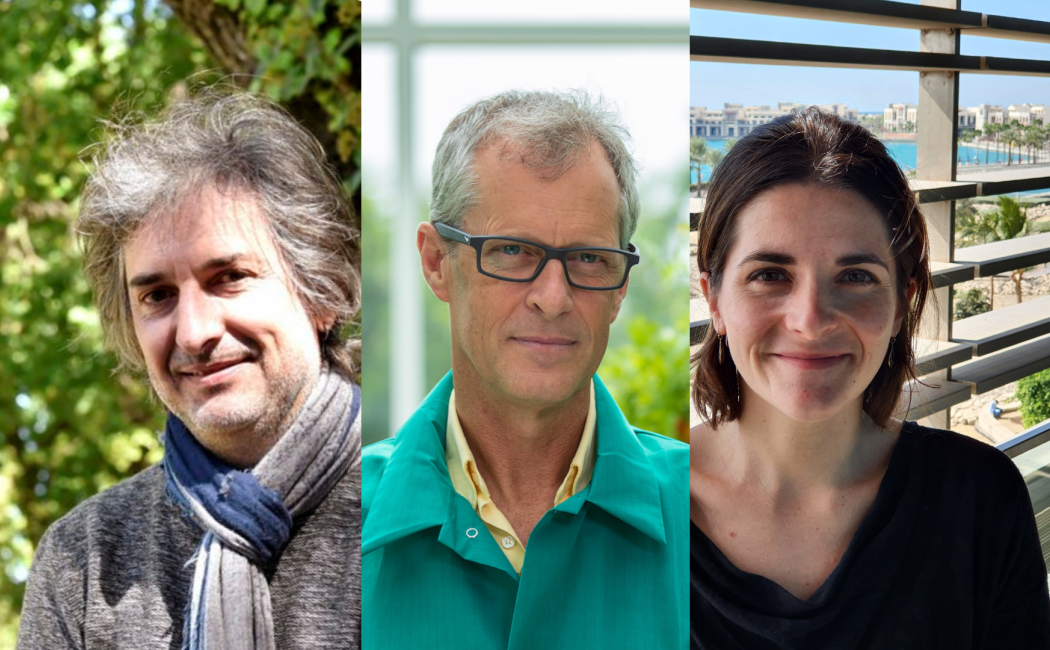Detail

Quinoa with Dr. Didier Bazile, Prof. Mark Tester, and Dr. Elodie Rey
– Part of the CDA Spring Lecture Series.
Dr. Didier Bazile, Prof. Mark Tester, and Dr. Elodie Rey will give a joint lecture on quinoa.
On Zoom
Theme
CIRAD-KAUST joint lectures – hosted by Prof. Mark Tester.
Quinoa Expansion Beyond Its Origin: Lessons and Perspectives for Sustainable Agriculture Under Global Changes
Speaker: Didier Bazile
Senior Biodiversity Advisor
UMR SENS Institute, ES department, CIRAD (France)
Abstract
The declaration by the United Nations General Assembly as “2013, the International Year of Quinoa” aimed to draw global attention to the role of quinoa's biodiversity and nutritional value. Quinoa diversity, at a continental scale, is associated with five main ecotypes, each one corresponding to specific conditions of altitude, latitude, and soils and climatic conditions. Thanks to its extraordinary genetic diversity, the crop is highly adaptable to different agroecological conditions and tolerant to frost, drought, and salinity. After a general presentation of quinoa’s spreading from the Andes to the world, I will present three examples of my research on quinoa: 1/ characterizing biodiversity with farmers for preparing participatory plant breeding programs; 2/ association between quinoa and other plants in arid conditions of Chile as an agroecological alternative to fight against drought and salinity stresses in agriculture; 3/ quinoa’s crop wild relative for adapting to global changes.
About the speaker
Didier Bazile is a senior scientist based at CIRAD (Montpellier, France). Agronomist, Bazile is an active researcher in agroecology with a focus on agrobiodiversity and plant genetic resources. He received a PhD in Rural Geography (Toulouse, 1998) and was graduated as Director of Research (HdR) (Montpellier, 2014). After different international experiences (Africa, Asia, South America), he joined the CIRAD in 2001 as Principal Scientist. Here he develops an ecosystem approach for in situ conservation of biodiversity and promotes participatory plant breeding research. For the International Year of Quinoa in 2013, Bazile coordinated the book called “The state of the art report on quinoa around the world in 2013” published by FAO and CIRAD. During 2014-2016, he was invited at FAO-HQ to serve as Visiting Expert and Quinoa International Focal Point. During this time, he gave technical assistance to 31 countries experimenting quinoa worldwide. Bazile is the founder and facilitator of the Global Collaborative Network on Quinoa for sharing experiences among 300 researchers from 75 countries. Today, he serves as CIRAD's Biodiversity Advisor.
Genomics and Phenotyping for Genetic Improvement of Quinoa
Speakers:
Mark Tester
Professor of Plant Science, Center for Desert Agriculture, KAUST (Saudi Arabia)
Associate Director, Center for Desert Agriculture, KAUST
Lead of The Salt Lab, KAUST
Elodie Rey
Postdoctoral Fellow, Center for Desert Agriculture, KAUST (Saudi Arabia)
Abstract
Quinoa (Chenopodium quinoa Willd.) is a highly nutritious crop that is adapted to thrive in arid and saline environments, so provides an opportunity to grow crops for high quality food in low quality soil, irrigated with low quality water. To facilitate genetic improvement of quinoa and to aid efforts in identifying genes underlying its notable abiotic stress tolerance, as well as a range of agronomic traits, we have sequenced and assembled to high quality the genome of one accession and now re-sequenced several hundred lines, to enable large scale association genetic studies. This work is being extended to include a study of heat tolerance in Chenopodium hircinum, with the aim of introgressing heat tolerance from this species into domesticated quinoa.
About the speakers
Mark Tester is Professor of Plant Science at King Abdullah University of Science and Technology (KAUST), Associate Director of the Center for Desert Agriculture, and co-Founder and Chief Scientist of Red Sea Farms LLC. In 2019, he was Head of the Food Sector at NEOM. Prior to joining KAUST in February 2013, he was an ARC Federation Fellow and Professor of Plant Physiology at the University of Adelaide, where he established The Plant Accelerator. Previously, he was a Senior Lecturer at the University of Cambridge, where he also received his PhD in 1988. Tester is now enjoying developing saltwater-based agricultural systems, to improve sustainability of food production.
Elodie Rey is a Postdoctoral Fellow in Plant Science as part of Prof. Mark Tester’s team and the Center for Desert Agriculture at King Abdullah University of Science and Technology (KAUST). For three years, she focused her research on advancing quinoa genomics knowledge and resources to support the domestication and breeding efforts to make quinoa a more resilient crop, better adapted to adverse environmental climate conditions. She received her PhD in Molecular and Cell Biology from the Fakulty of Science of the University Palacký and the Center of Plant Structural and Functional Genomics of the Institute of Experimental Botany, Olomouc (Czech Republic) in 2018.
This event occurred in the past. You can watch the recording on our YouTube channel.